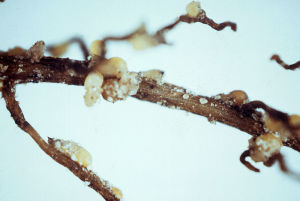Syngenta Readies All-In-One Seed Treatment for Commercialization

Segment of soybean root infected with soybean cyst nematode. Signs of infection are white to brown cysts filled with eggs that are attached to root surfaces.
North American farmers will have a new tool in 2014 to help manage the most damaging Soybean pathogen in North America. The soybean cyst nematode (SCN) causes about $1.5 billion in yield losses for U.S. growers alone, according to Syngenta.
Growers manage the pest by using seed treatments for early defense, insecticide applications during outbreaks and cultural practices.
“Growers can follow sound agronomic practices – planting resistant varieties, rotating crops, controlling weeds and keeping farm equipment clean – but SCN is a hardy pathogen,” Syngenta Head of Agronomy Chris Cook said. “In the end, we’ve only managed to slow the damage. A piece of the puzzle is missing. We only have a defense when what we need is a good offense.”
In 2014, Syngenta will offer Clariva Complete Beans, a nematicide/insecticide/fungicide on-seed application of separately registered products that adds a nematicide to its broad-spectrum seed treatment of CruiserMaxx Beans with Vibrance insecticide/fungicide. Clariva Complete Beans will provide an offense against SCN to complement current defensive practices, such as rotating crops and planting SCN-resistant varieties, according to Syngenta.
Clariva Complete Beans provides a direct mode of action that is lethal to the pest. The nematicide within Clariva Complete Beans protects soybeans from SCN during all growth stages by killing juvenile, as well as adult, SCN.
On-farm trials prove the yield increase offered by Clariva Complete Beans at a three to five percent yield advantage in SCN-infested soils when combined with SCN-resistant varieties, Syngenta said.
“It is important that we continue to adapt our management practices and introduce new management solutions for growers,” said Dale Ireland, Syngenta seed care technical product lead. “SCN-resistant varieties offer protection that limits reproduction of SCN, but that protection doesn’t halt reproduction completely. The SCN that is capable of reproducing despite the resistant varieties, can increase in population over time and diminish the effectiveness of the SCN-resistant gene. This is cause for concern, especially considering 95% of the market is sourced from one genetic line of SCN resistance.”
Source: Syngenta, edited by David Frabotta, editor






